2007年VOA标准英语-Teaching Youth to Prevent HIV and AIDS in DC(在线收听)
Washington, DC
11 September 2007
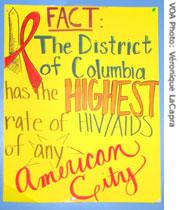 |
| In Washington, D.C., about one in fifty people has AIDS, and the annual rate of new AIDS cases is more than ten times the national average |
Adam Tenner is the Executive Director of Metro TeenAIDS, a Washington, D.C. group that works with local youth to help them better understand and confront the AIDS epidemic. Some 100,000 young people between the ages of 13 and 24 live in the nation's capital, and Tenner estimates that there is approximately one HIV-infected young person in every classroom in the District.
"We know that young people are being infected," says Tenner. "Mostly young African American women, and young, Latino and African American […] men who have sex with other men."
Even with the high infection rates, Tenner says it can be difficult to get local teenagers to take AIDS seriously. With high rates of gun violence in many neighborhoods, Tenner explains, many young people struggle just to survive day-to-day. "Where that kind of low expectation exists it's hard to really worry about a virus that may kill you ten years from now."
And the D.C. school system, Tenner adds, has not been helping, because young people get very little, if any, HIV education in the classroom.
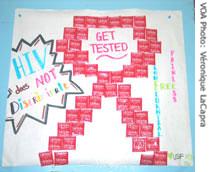 |
| Metro TeenAIDS provides HIV counseling and testing services for young people |
Along with fun informational events, Metro TeenAIDS provides young people with year-round reproductive health education in D.C. schools and through community organizations. They also provide HIV counseling and testing services.
As Metro TeenAIDS program director Anne Wiseman puts it, the group creates "a space" where young people can get answers to the questions they need, but are often afraid, to ask. "I tell young people, I kind of set the stage for them, that there's nothing they can ask me that's going to knock me off my seat, because I've heard it all!"
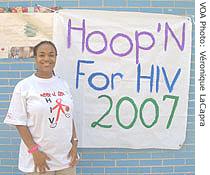 |
| Metro TeenAIDS program director, Anne Wiseman. She helped organize a basketball tournament to get young people to come out for National HIV Testing Day |
Another way that Metro TeenAIDS creates a supportive environment for young people is through its after-school youth center, called "FreeStyle."
Dwayne Lawson-Brown, 23, has worked and volunteered for Metro TeenAIDS for the past seven years. He started an "open-mic night" at FreeStyle: an evening when young people can come to the center and sing, rap, or read poetry.
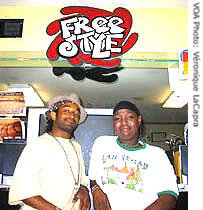 |
| Dwayne Lawson-Brown (left) started an "open mic night", at Metro TeenAIDS' youth center, "FreeStyle". Terra Moore (right) is an open mic night participant |
Acceptance and empowerment are at the core of Metro TeenAIDS' mission. Executive Director Adam Tenner says the group's peer outreach program plays a critical role. The group employs 15 young people, who are trained to take the message of HIV prevention out to the streets. By having young people talk to their peers, says Tenner, "it's not some adult coming to them, and saying, 'Hey, you should do this, or you should do that.' And it's incredibly effective."
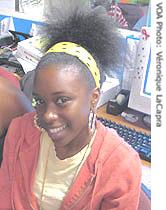 |
| As a peer outreach educator for Metro TeenAIDS, fifteen-year-old Desha Smith talks to other young people about HIV and AIDS, and encourages them to get tested |
But Desha says she loves her job. "It helps me out because it helps me learn about AIDS and HIV," she explains, "and it helps me protect my friends." She says that it is the best job that she could have, because young people her age really need to know about HIV and AIDS. According to Desha, many of her peers are already sexually active. About HIV/AIDS, Desha has this to say: "I just want to get it out there that it's bad […] and it needs to be stopped in DC."
And Desha may soon be getting some help from the city — at least indirectly. The mayor of Washington, D.C., recently launched a three-year initiative to prevent the spread of HIV in young people. The staff at Metro TeenAIDS will be watching. They hope the city will follow through on its promises, and join them in giving D.C.'s young people the information and skills they need to protect themselves from AIDS.